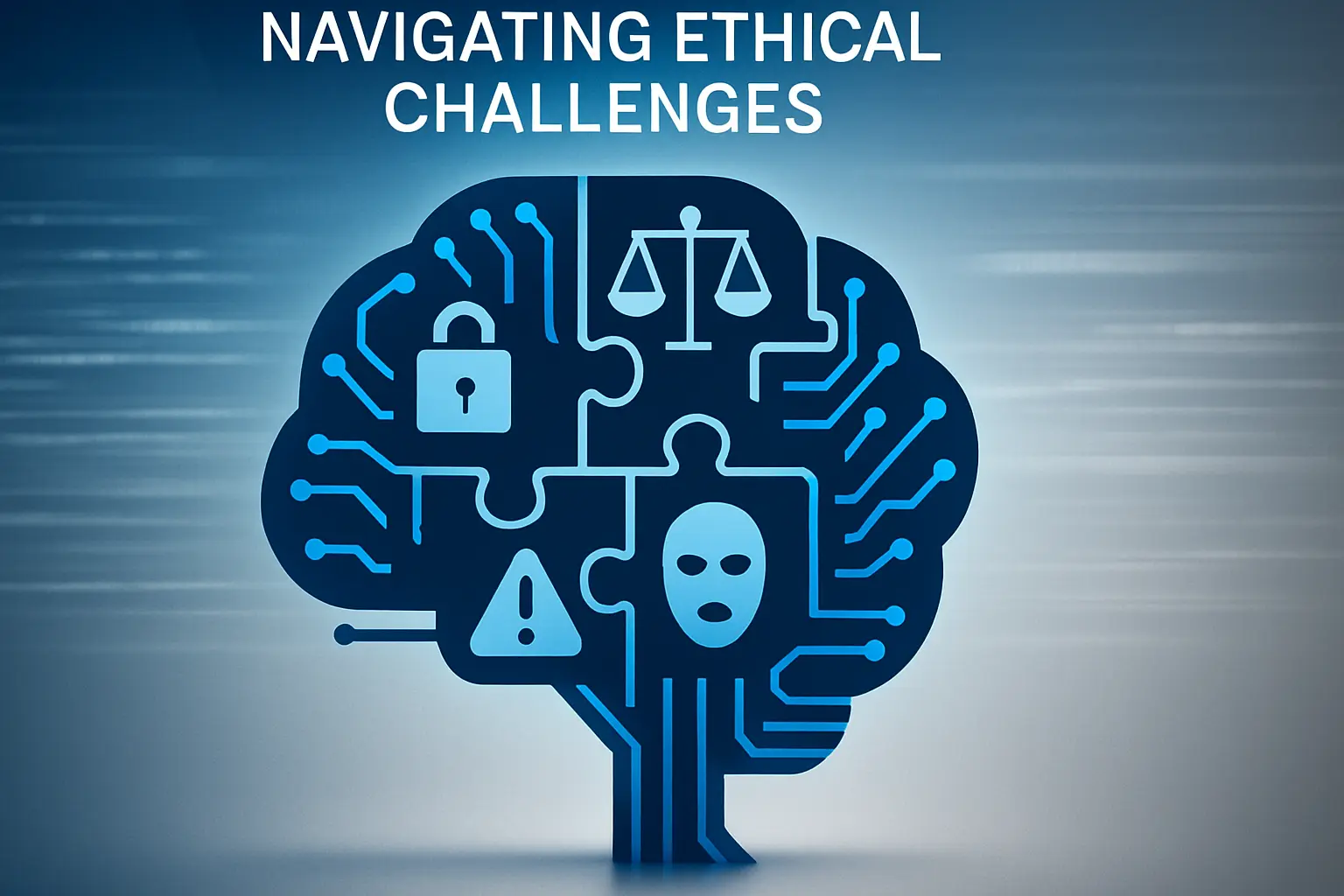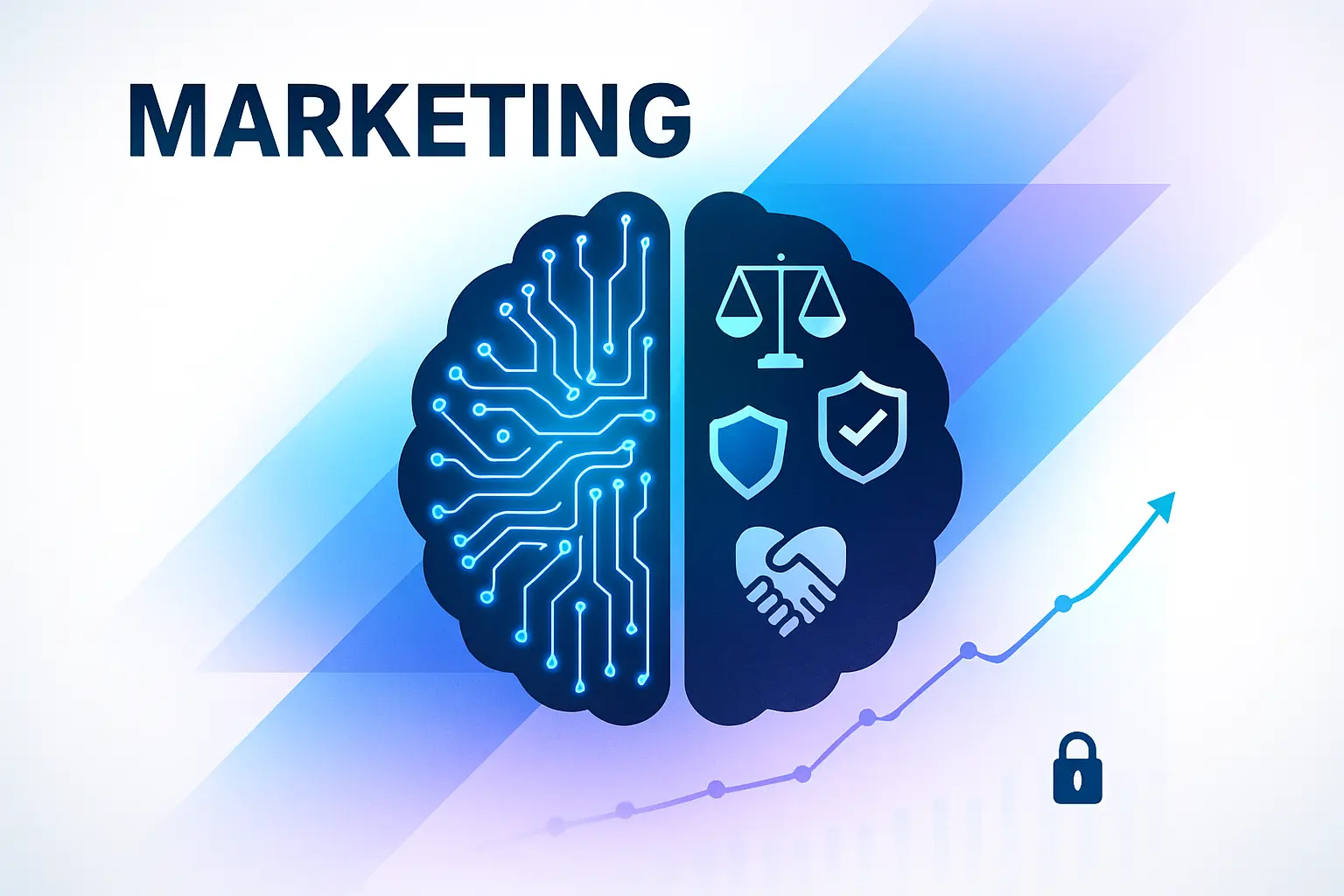Ethics in AI Marketing: What You Should Know
Karl Marais | 29 May 2025
AI is everywhere—writing emails, powering ads, and personalizing shopping experiences.
But while these advanced AI marketing tools offer big advantages, they bring along a major risk: ethical missteps.
The challenge isn’t usually a technical glitch—it’s a question of trust.
Here’s how to defuse the potential ethical time bomb in AI marketing before it damages your business.
Understanding AI in Marketing
Artificial intelligence has transformed how businesses connect with customers.
By automating routine marketing tasks, AI lets companies stress less over execution and focus on strategy.
But as AI becomes central to marketing, brands must pay careful attention to AI marketing ethics.
Ethical AI usage—especially around transparency and consent—sets companies apart, building trust with customers and protecting against future risks.
What is AI Marketing?
AI marketing means using artificial intelligence to enhance all aspects of marketing.
This includes analyzing consumer data, predicting trends, and personalizing experiences to optimize campaigns and drive results.
The ideal is a partnership between data-driven insights and human creativity, resulting in robust strategies that engage customers better than either humans or machines alone.
How AI is Transforming Marketing Strategies
AI has made personalized, data-driven marketing campaigns easier to launch than ever before.
Brands now leverage AI to predict customer needs, automate repetitive tasks, and deliver tailored content.
At the same time, AI marketing analytics gives teams powerful real-time insights for strategic adjustments.
Yet, these innovations must operate within ethical boundaries to protect consumer trust.
For more on efficiency gains, see how AI automation helps you do more with less marketing staff.
The Importance of Ethics in AI Marketing
Ethics in AI marketing is the backbone of responsible AI-driven advertising.
Embedding ethical values from the outset, not as an afterthought, safeguards a brand’s integrity and trust.
Modern AI marketing ethics revolve around respecting privacy, being transparent about data usage, and avoiding manipulative or discriminatory practices.
Building a trustworthy brand means aligning practices with consumer expectations and sometimes exceeding legal requirements.
Leading companies adopt clear industry standards to avoid reputation damage; restoring trust after an ethical lapse can take years.
See The Impact of Artificial Intelligence on SEO Strategies for more on integrating ethical considerations.
Why Ethics Matter in Marketing
Today’s consumers are informed and selective.
Transparency and ethical behavior convert into loyalty, while any hint of dishonesty can send customers to competitors.
Companies that bake respect, fairness, and clear communication into their AI operations consistently outperform those that chase short-term gains through shortcuts.
Respecting privacy is especially critical. Data-driven AI decisions that are not transparent—or seem manipulative—quickly erode trust.
Marketers who commit to prioritizing ethics will deepen customer relationships and fortify long-term brand value.
For more on strategic approaches, see Digital Marketing Strategy vs Digital Marketing Tactics.
Consequences of Ignoring Ethical Guidelines
Ignoring AI marketing ethics can be disastrous. Brands risk consumer backlash, negative media attention, costly lawsuits, and long-term reputation loss.
Missteps—intentional or not—signal to customers that a company is untrustworthy.
Beyond trust, there are also regulatory and legal stakes. Governments are tightening data protection and ethical marketing laws.
Violations can result in major fines. Even worse, damage to brand reputation is hard to reverse.
To avoid these outcomes, inspect How to Design an SEO-Friendly Website Structure for steps to build a strong and ethical foundation.
Key Ethical Challenges in AI Marketing
AI marketing introduces several meaningful ethical risks, including:
Privacy Concerns
AI tools depend on large volumes of data. Mismanagement may violate privacy regulations like GDPR or CCPA, resulting in legal penalties and lost trust.
Businesses must balance data-driven capabilities with transparency, telling users how data is collected, stored, and used.
Bias and Discrimination
If AI models are trained on biased data, they can perpetuate or amplify discrimination.
Responsible brands invest in inclusive, diverse datasets and regularly test their algorithms for fairness.
Transparency and Explainability
Consumers must be able to understand how AI-driven decisions are made.
Explainable AI (XAI) builds trust and accountability by making decision processes clear. Marketers should openly communicate about AI’s role in campaigns.
Consumer Deception
Some AI-driven tactics risk crossing the line into manipulation. “Dark patterns” undermine autonomy and erode trust.
Ethical AI should empower, not deceive, users, and marketers need to eliminate manipulative practices.
Ethical Frameworks and Guidelines
To ensure responsible AI in marketing, companies should align with established frameworks and evolve their own ethical policies.
Key pillars include transparency, accountability, and fairness—all informed by standards from bodies like UNESCO.
Existing Ethical Standards
Industry standards around data privacy, consent, and accountability anchor ethical AI practices.
Adopting best practices not only fulfills legal obligations but also shows consumers a brand’s commitment to doing the right thing.
Developing Your Own Guidelines
Every company should craft guidelines that reflect its unique values and context.
Implement governance measures, including regular AI ethics audits and team-wide training, to ensure ongoing compliance.
For more, read about integrating AI and human creativity for balanced, ethical innovation.
Implementing Ethical AI Practices
Practical execution matters as much as policy.
Success depends on clear leadership, regular risk assessments, cross-departmental collaboration, and investment in tools that monitor for bias and explainability.
Ensuring Ethical AI Usage
Start with strong data governance and fairness in algorithm design.
Assess for bias, encourage interdisciplinary oversight, and foster a culture of responsibility, so ethical marketing becomes second nature.
Monitoring and Auditing Ethics
Use dedicated monitoring tools, conduct regular ethics audits, and maintain transparency reports to constantly check and correct your AI systems’ behavior, elevating your business’s credibility.
The Future of AI Ethics in Marketing

As AI marketing tools become standard, robust ethics must evolve alongside them.
New technologies and stricter regulations will keep pushing the bar higher.
Companies that stay proactive—updating policies, monitoring impact, and engaging stakeholders—will be best positioned for long-term success.
Conclusion
Ethical AI marketing isn’t just smart; it’s essential.
Transparency, fairness, accountability, and privacy—these are the foundations for sustained trust and business growth.
As AI’s influence grows, marketers must guide its evolution by embedding responsible practices into every campaign and platform.
For further insights, explore AI in Social Media Management.
The time to act is now: champion ethical AI to protect your business today and into the future.




